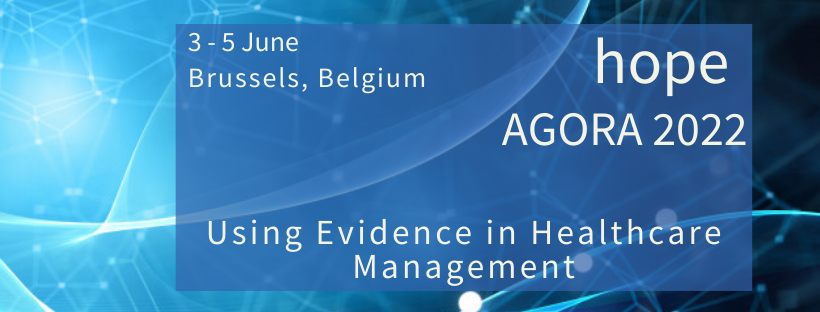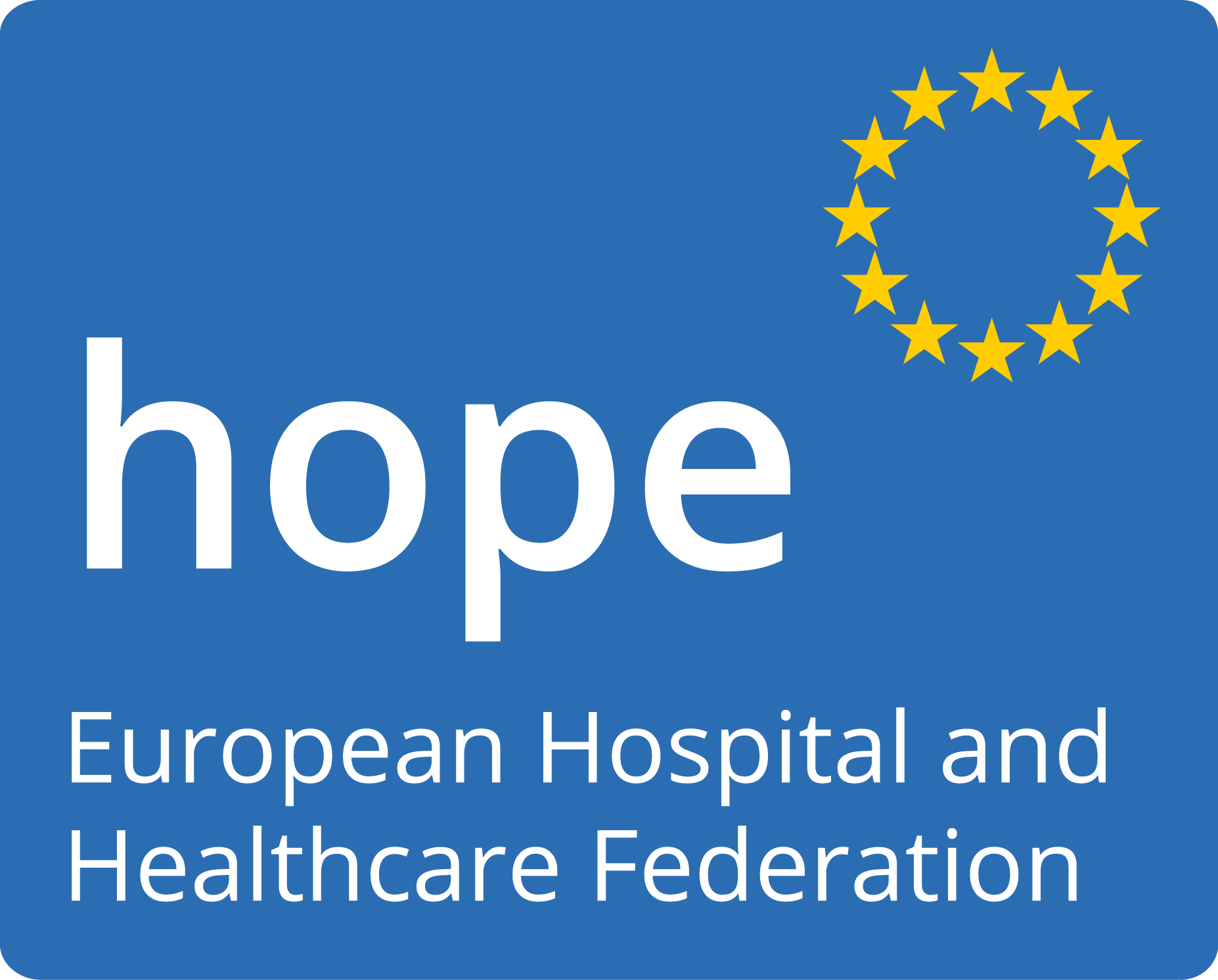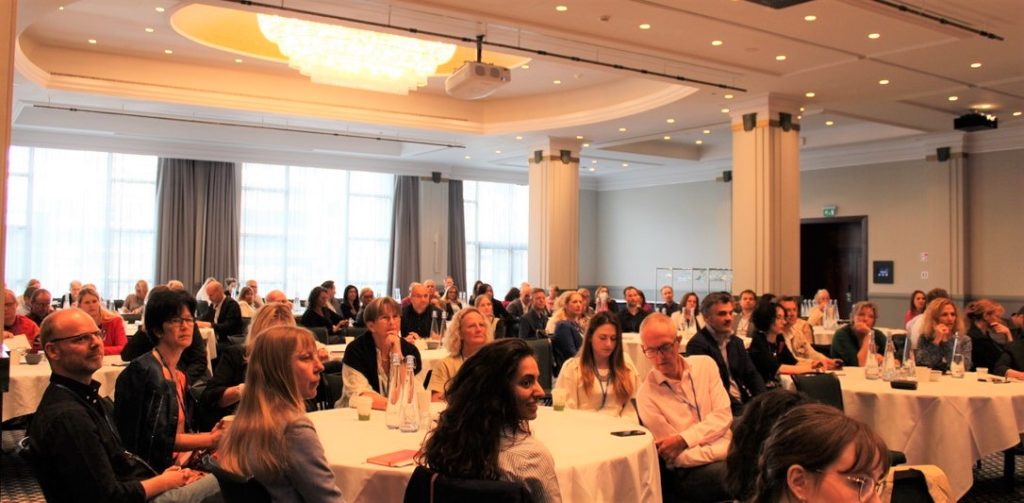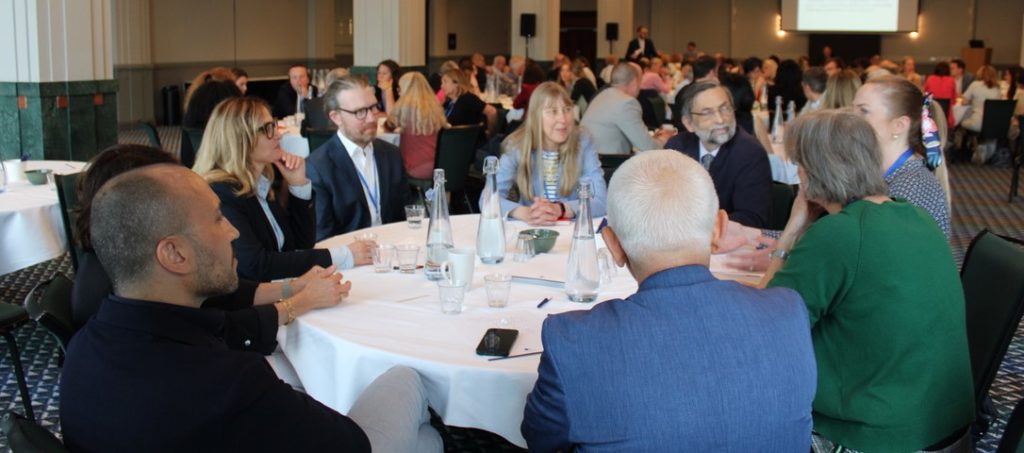HOPE Agora 2022
hope Agora 2022

Welcome
Programme & PowerPoint presentations
Participants & hosts reports
Did you miss the HOPE Agora 2022? Take a look at the 2022 Agora Report !
DATE AND LOCATION
3 June – 5 June 2022
Hotel DoubleTree by Hilton Brussels City
Rue Gineste 3,
1210 Brussels
Belgium
TOPIC
Using Evidence in Healthcare Management
ABOUT
The theme for HOPE Agora 2022 was “Using Evidence in Healthcare Management”. It directly followed and built upon the HOPE Agora 2019 which topic was “Evidence-Informed Decision-making in Healthcare Management”.
Since the establishment of the term “evidence-based medicine” in the 1980s, the call for a more systematic use of evidence has spread to other areas, such as health policymaking and management. This approach means that policy-making and managerial decisions should be based on best available evidence and not on beliefs and long-established practices.
For the purposes of the HOPE Agora 2022, the broadest possible understanding of the term “evidence” was used. Such an understanding includes findings from scientific publications, ranging from randomised control trials to case reports. It also include local evidence, which is the contextual information necessary to take a decision. Examples of such contextual information are analysis of locally available data, gathering information from stakeholders and considering the cultural, political, administrative and other settings which may influence a decision.
The use of evidence in management should not be perceived as a rigid, one-size-fits-all solution, but rather a way of thinking about how to make decisions at three levels: national/regional; top management level of hospital and healthcare services; unit/department level. Many examples are available in the report of the HOPE Agora 2019.
In order to identify the up-to-three good practices, the participants were invited to check from where evidence is coming, within which process they are used and with which results.
The conference hosted experts in this field and the HOPE Exchange Programme participants, who visited a foreign country to learn about how these issues are tackled in a different setting. In increasingly complex health systems, the ability to use all types of available evidence to improve decision-making in healthcare is crucial to ensure that citizens are offered the best care possible.
****************
Highlighted topic: Beyond hospital data – from hospital performance to system performance
A session was organised in collaboration with OECD, the Organisation for Economic Co-operation and Development, and HealthPros, a Marie Sklodowska-Curie Innovative Training Network for Healthcare Performance Intelligence Professionals.
In 2019, in collaboration with the HealthPros researchers, the use of performance data for evidence-based decision-making was explored by managers involved with the HOPE Exchange Programme. The aim was to find out why, what and how performance data is collected, reported and used in routine managerial work. During the 2019 Ljubljana AGORA, preliminary results of this work were presented and engaged participants in a very lively discussion on the topic. More information is available in the 2019 AGORA Report. Detailed results were published in an open access academic paper later in 2020 available here.
One can argue (and discuss!) that, among healthcare organisations, hospitals have progressed furthest in the measurement, reporting and use of performance data for evidence-based managerial decision-making.
For the purposes of the HOPE Exchange Programme 2022, expanding on last year’s work as well as in the context of the experience gained with the 2020 and 2021 COVID-19 crisis, we wanted to engage in a conversation on hospital performance in the broader context of the healthcare system. What happens to hospital patients before and after they “use” hospital services? Which information “comes with” a patient to the hospital and which information “leaves with” him or her after discharge? To what extent are hospital episodes managed as part of broader disease pathways? What are the existing feedback loops and options for monitoring care pathways with aggregated patient data? There have been discussions about integrated care for at least 20 years now – to what extent do you see your work “integrated” in the broader delivery system? Which care processes do exist as integrated care pathways? What are the linkages and what are performance metrics for integrated care? How successful are we in making a shift from measuring hospital performance to measuring system performance? What is the role of patients in this process? How does a population-based approach to care provision influence operational use of performance data in your workplace?
We specifically were eager on looking at this topic from a perspective of operational-level managers in the system. The results were used as input for discussions at the OECD on the broadening from hospital performance measurement to the measurement and governance of integrated health care delivery systems.
****************
CONFERENCE OBJECTIVES
-
To discuss the challenges and opportunities for strengthening the use of evidence in healthcare management;
-
To understand different approaches on evidence-based decision in healthcare employed by managers, researchers, decision-makers, patients and other stakeholders;
-
To exchange experience in using of evidence implemented by healthcare organisations in European countries.
Read the HOPE Agora 2022 Theme Guidance Document
HOPE Agora 2022 Leaflet
HOPE Agora Archives
Programme
The HOPE Agora 2022 took place on 3 – 5 June 2022.
Please find below the detailed programme of the event:
HOPE Agora 2022 Agenda
PowerPoint presentations:
– HOPE Agora 2022 – course of the event
– Beyond hospital data: Changes in governance and data use during COVID-19 – Damir Ivankovic
– Impact of COVID-19 on clinical pathways for AMI, cancer and acute care – Sofia Carvalho
Presentation of good practices in the HOPE Exchange Programme participating countries, Part 1
1- Austria
2- Switzerland
3- Germany
4- Denmark
5- Estonia
Presentation of good practices in the HOPE Exchange Programme participating countries, Part 2
6- Finland
7- France
8- Greece
9- Ireland
10- Italy
11- Latvia
Presentation of good practices in the HOPE Exchange Programme participating countries, Part 3
12- The Netherlands
13- Poland
14- Portugal
15- Serbia
16- Spain
17- United Kingdom
Participants and hosts Reports Material
Download Form P3 – Questionnaire for the participants’ reports
Download Form H2 – Questionnaire for the hosts after the Exchange Programme
- “Twelve factors supporting transfer of learning after participating in the HOPE Exchange Programme“, Bertil Selde Krogh, National HOPE Coordinator for Denmark.



